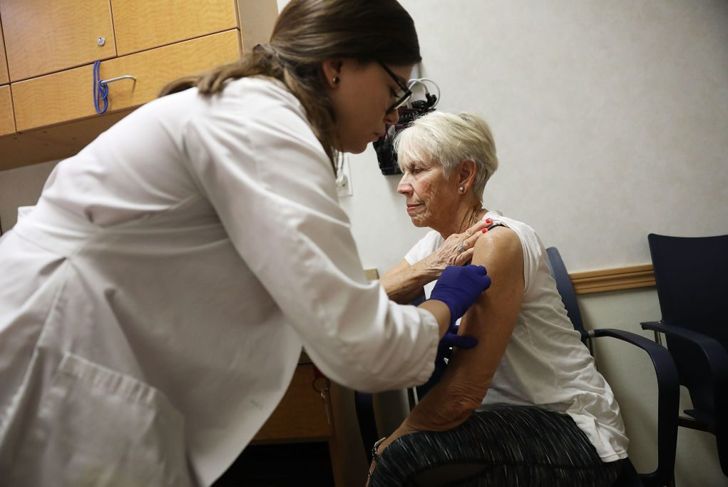If you’ve ever had the misfortune of stepping on a rusty nail, then you’ve probably been to the doctor for a booster tetanus shot. But what exactly is tetanus, and how does the shot help keep you safe? Tetanus is an infection caused by the bacterium Clostridium tetani. When these bacteria enter the body, they produce a poison or toxin that can cause serious health problems. To protect against this infection, the CDC recommends vaccination against tetanus for people of all ages.
The bacterium that causes tetanus is related to botulism.
The bacterium that causes tetanus, Clostridium tetani, is closely related to another famous disease-causing microbe — Clostridium botulinum, the bacterium that causes deadly botulism. Both of these bacterium are anaerobic rod-shaped organisms that reside in the soil. Both produce toxins that are extremely harmful to humans and many animals. The Clostridium genus contains about 100 species, including Clostridium difficile, which can cause diarrhea and many other less-harmful species.
Tetanus is not contagious from person to person.
Unlike many other diseases like the flu, strep throat, or the common cold, tetanus infection is not contagious from one person to another. Instead, tetanus bacteria generally enter through a break in the skin, such as a cut or puncture caused by a contaminated nail, tack, or thorn (even if it isn’t rusty). Tetanus bacteria live in soil, saliva, dust, and manure, so be especially careful if you are working in the garden or with tools that are stored outside.
Researches have studied tetanus since ancient times.
Tetanus is a deadly disease that our ancestors were well aware of, and studied, even in ancient times. The Greek physician Hippocrates, the namesake of the Hippocratic oath taken by all doctors, described tetanus in one of his manuscripts from the 5th century B.C. However, scientists and doctors did not understand the cause of the disease until 1884, when Italian scientists Antonio Carle and Giorgio Rattone of the University of Turin demonstrated the transmissibility of the disease.
1924 saw the development of the tetanus vaccine.
Scientists made the tetanus vaccine based on the administration of an inactive tetanus toxoid that places the immune system on alert. The system is prepared to react if the toxin is again encountered in the body. A major step in the development of a vaccine, researchers discovered and produced the first inactive tetanus toxoid in 1924. In 1938, a more effective version successfully prevented tetanus in members of the armed forces during World War II. Today, doctors often give the tetanus vaccine in conjunction with other vaccines, such as DTaP, which prevents diphtheria and pertussis.
The tetanus vaccine helps your body quickly recognize and fight the tetanus toxin.
The tetanus vaccine is an example of artificial active immunity. The human body generates this type of immunity when a dead or weakened version of the disease is introduced to the body, resulting in an immune response which includes the production of antibodies. If the person is exposed to the disease again, the immune system will recognize the antigen, or foreign substance, and quickly produce antibodies to fight off the disease more rapidly. Since the introduction of the tetanus vaccine, infections are uncommon in countries like the United States. Nearly all cases of tetanus afflict people who didn’t receive the vaccine or who are not up to date on their booster shots.
Tetanus can cause serious health problems.
When tetanus bacteria invade the body, they produce a poison or toxin that causes painful muscle contractions. These contractions often cause a person’s neck and jaw muscles to lock, making it hard to open the mouth or to swallow — that’s why another name for tetanus is “lockjaw.” Other complications include muscle spasms and damage to the nervous system. Spasms that occur in the vocal cords or respiratory muscles can cause breathing problems. Muscle spasms may be so severe that they cause broken bones. Tetanus can even cause high blood pressure or abnormal heart rhythms. In cases where tetanus goes untreated, it can be fatal.
Tetanus symptoms usually begin within three to twenty-one days of infection.
After a cut or puncture introduces the tetanus bacteria to the body, the early symptoms begin showing up within about three days, though it may take up to three weeks in some cases. Lockjaw and stiffness that interferes with swallowing are generally the first symptoms to appear. Other early symptoms include fever, sweating, headache, high blood pressure, or an abnormally fast heart rate. When the spasms begin, they often start in the jaw and then move throughout the body. Each spasm can last for several minutes and may continue to occur up to one month following onset.
The tetanus vaccine requires multiple doses.
For maximum effectiveness, the tetanus vaccine requires periodic booster shots to ensure the immune system can still mount a quick and effective response should an infection develop. In the United States, the childhood vaccination schedule recommends two-month-old children receive their first dose of DTaP, a vaccine that prevents diphtheria, tetanus, and pertussis. They should receive four additional doses during their childhood years. Teens and adults should receive a booster shot every ten years, or after a possible tetanus exposure, for the most effective protection.
Pregnant women should receive a tetanus vaccine.
The Centers for Disease Control and Prevention (CDC) recommends pregnant women receive a Tdap vaccine during the third trimester. The injection protects against tetanus, diphtheria, and pertussis and anyone over the age of 11 can receive it. The best time to get the shot is between the 27th and 36th week of pregnancy, the earlier the better, because after receiving the vaccine the body produces protective antibodies the fetus will receive in utero.
The tetanus vaccine is effective.
Even though tetanus sounds scary, the good news is that the tetanus vaccine does a great job at protecting people from this disease. The vaccine is so effective that scientists estimate in the U.S., 100% of people who receive it are safe from tetanus. This is borne out by the dramatic decrease in tetanus cases; since the vaccine became widespread, the U.S. has enjoyed a 93% reduction in the occurrence of tetanus and a 99% reduction in fatalities resulting from tetanus.

 Home
Home Health
Health Diet & Nutrition
Diet & Nutrition Living Well
Living Well More
More




















